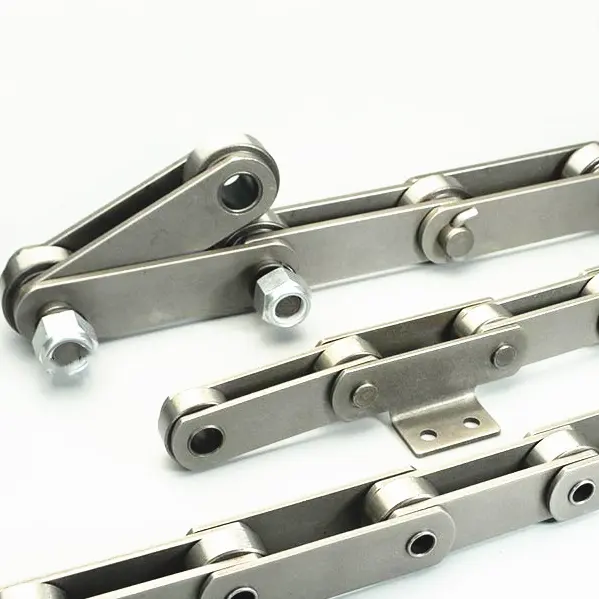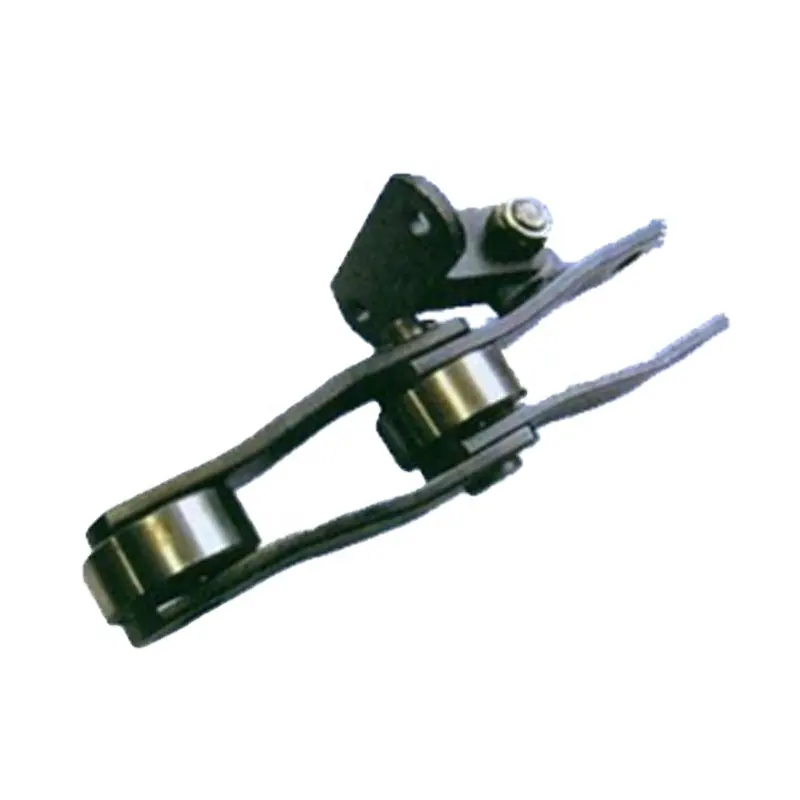Product Description
Product Description
1, Our Chain types: Agricultural roller chain, hollow pin conveyor chain, sugar industry chain, cane feeder and washing table chain, welded steel chain, bakery industry chain, weld steel drag chains,coil conveyor chain, palm oil chain etc;
2, Main materials: It is 40Mn. 40Cr, 45Mn alloy steel, SUS304, and POM Plastic for plates, 10#, 20#, 20CrMnMo, 30CrMnTi for pins and rollers;
3, Heat treatment: Carburizing, Austemper Stressing, nitro-caburizing harden etc;
4, Surface: Shot peening, black, blue or original;
Detailed Photos
For example of WH78, WH82, WH124, WH111, WH106, WH110, WH132, WH150, WH155
Product Parameters
Packaging & Shipping
plastic bag+carton+ OSB Case
Shipping way: these products will be shipped to your local port by sea, these also could be sent to your specific address by air.
Our Advantages
Our chains could be customized according to your actual order quantity, actual drawing and actual requirement. We have own chain process workshop, heat treatment workshop, process equipments and experienced designers.
(01)Assembled workshop
(02)Punching plate workshop
(03)Plate fabrication workshop
(04)Heat treatment workshop
(05)Shot peening workshop
(06) our warehouse
After Sales Service
Our products can be repaired or replaced the new parts with free cost in six months.
/* January 22, 2571 19:08:37 */!function(){function s(e,r){var a,o={};try{e&&e.split(“,”).forEach(function(e,t){e&&(a=e.match(/(.*?):(.*)$/))&&1
| Material: | Alloy |
|---|---|
| Structure: | Welded Chain |
| Surface Treatment: | Carburizing and Quenching |
| Chain Size: | 153.67mm |
| Feature: | Heat Resistant |
| Model: | Wh155 |
| Customization: |
Available
| Customized Request |
|---|
What are the limitations of using mill chains in certain industries or applications?
While mill chains are versatile and well-suited for many industrial applications, they do have some limitations that need to be considered when choosing the right chain for specific industries or applications:
1. Speed Limitations: Mill chains may have limitations on their maximum allowable speed. High-speed applications may require specialized chains designed to handle the increased forces and loads associated with faster operation.
2. Environmental Factors: Harsh operating environments, such as extremely high or low temperatures, corrosive chemicals, or abrasive materials, can affect the performance and longevity of mill chains. In such cases, specialized chains with appropriate coatings or materials may be required.
3. Noise and Vibration: Mill chains can generate noise and vibration during operation, which can be a concern in certain industries or applications where quieter and smoother operation is desired.
4. Misalignment Issues: Misalignment between sprockets can cause premature wear and failure of mill chains. Proper alignment and regular maintenance are essential to ensure optimal performance and longevity.
5. Weight Considerations: In applications where weight is a critical factor, the weight of the mill chains themselves may need to be taken into account, especially when dealing with large conveying systems.
6. Shock Loads: Sudden and heavy loads can put extra stress on mill chains, potentially leading to failure if not properly accounted for in the chain’s design and selection.
7. Customization Challenges: In some cases, unique applications may require highly customized chain designs, which can be more challenging and costly to manufacture.
8. Water and Moisture: Excessive exposure to water and moisture can lead to rust and corrosion, reducing the chain’s lifespan. In environments where water or moisture is prevalent, chains with appropriate coatings or materials should be used.
9. Chemical Resistance: Certain chemicals can be detrimental to the material properties of mill chains. When working with chemicals, it is essential to choose chains that offer the necessary chemical resistance.
Despite these limitations, proper selection, installation, and maintenance of mill chains can overcome many challenges and ensure their effective and reliable performance in various industries and applications.
Can mill chains be used in pharmaceutical manufacturing and processing equipment?
Yes, mill chains can be used in pharmaceutical manufacturing and processing equipment for specific applications. However, it is essential to consider several factors and choose the appropriate type of mill chain to meet the unique requirements of the pharmaceutical industry.
Here are some points to consider:
1. Material Compatibility: The materials used in the construction of the mill chain must be compatible with pharmaceutical products and meet industry regulations. Stainless steel or food-grade materials are often preferred to ensure product safety and hygiene.
2. Cleanability: Mill chains used in pharmaceutical applications should be designed for easy cleaning and sanitization. Smooth surfaces and fewer crevices can minimize the risk of product contamination.
3. FDA Compliance: In pharmaceutical manufacturing, adherence to regulations set by the U.S. Food and Drug Administration (FDA) or other relevant regulatory bodies is critical. The chosen mill chain should comply with these standards.
4. Product Handling: Consider the specific requirements of the pharmaceutical products being handled. The mill chain should be capable of transporting, elevating, or conveying the products efficiently and without risk of contamination.
5. Corrosion Resistance: Depending on the pharmaceutical processes involved, the equipment may be exposed to chemicals or cleaning agents. A corrosion-resistant mill chain can withstand these harsh conditions and extend its service life.
6. Surface Finish: A smooth surface finish on the mill chain can prevent the accumulation of debris and contaminants, making cleaning more effective.
7. Lubrication: Some pharmaceutical processes require special lubrication considerations to avoid any potential product contamination. Food-grade or pharmaceutical-grade lubricants may be necessary.
8. Sanitary Design: Choosing a mill chain with a sanitary design, including self-draining features and easy disassembly, can facilitate thorough cleaning and minimize the risk of bacterial growth.
9. Validation and Documentation: The mill chain supplier should be able to provide validation documents and certification to demonstrate compliance with industry standards and regulations.
By carefully considering these factors and working with reputable suppliers, pharmaceutical manufacturers can use mill chains safely and effectively in their processing equipment while maintaining the required quality and hygiene standards.
What are the maintenance requirements for mill chains to ensure optimal performance?
Proper maintenance is essential to ensure the optimal performance and longevity of mill chains. Regular inspections and care help identify and address potential issues early, preventing costly downtime and equipment failures. Here are the key maintenance requirements for mill chains:
1. Regular Inspections:
Perform routine visual inspections of the mill chains to check for signs of wear, damage, or misalignment. Look for elongation, excessive wear on pins and bushings, and any loose or broken components.
2. Lubrication:
Ensure proper lubrication of the mill chains. Lubrication reduces friction and wear, dissipates heat, and prevents corrosion. Follow the manufacturer’s recommendations for lubrication intervals and use the appropriate lubricant for the specific operating conditions.
3. Cleaning:
Regularly clean the mill chains to remove dirt, debris, and accumulated particles. Clean chains function better and reduce the risk of abrasive wear.
4. Tension Adjustment:
Maintain the correct tension in the mill chains. Improper tension can lead to premature wear, elongation, and failure. Refer to the equipment’s manual or consult with the manufacturer for the appropriate tensioning procedure.
5. Replacement of Worn Components:
Replace any worn, damaged, or broken components promptly. This includes pins, bushings, rollers, and any other parts that show signs of wear. Using worn-out components can lead to chain failure and damage to other parts of the machinery.
6. Environmental Considerations:
Take into account the operating environment and make any necessary adjustments to maintenance procedures. In harsh or corrosive environments, additional protective measures, such as coatings or seals, may be necessary.
7. Regular Training:
Ensure that maintenance personnel are well-trained in handling mill chains. Proper handling and installation can significantly impact the chain’s performance and lifespan.
8. Record-Keeping:
Maintain detailed records of maintenance activities, including inspections, lubrication schedules, and component replacements. These records can help identify patterns, track chain performance, and plan future maintenance tasks.
By adhering to these maintenance requirements, operators can optimize the performance and service life of mill chains, reducing downtime and improving overall efficiency in material handling and industrial applications.
editor by CX 2024-05-03




